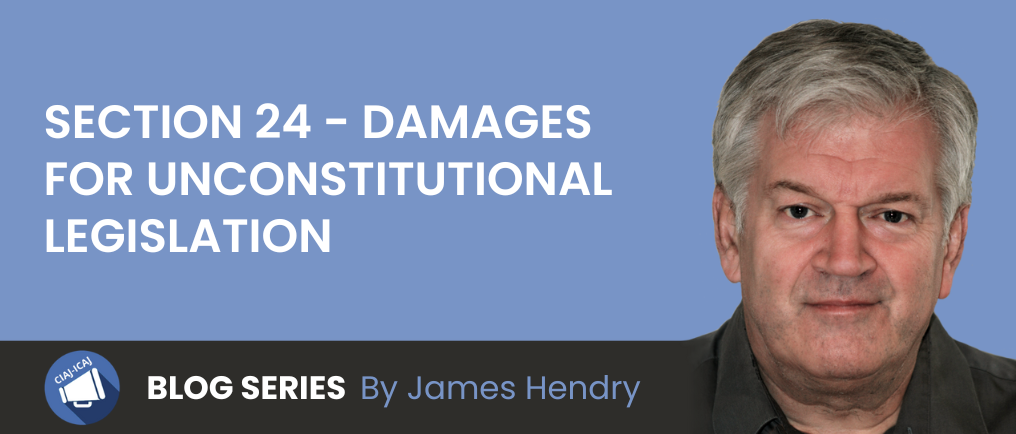Section 24 – Damages for Unconstitutional Legislation

This blog post is part of a series on “SCC Decisions and more” written by CIAJ’s collaborator James Hendry. Read all his posts here.
Section 24 – Damages for unconstitutional legislation
The Supreme Court of Canada recently confirmed that individuals may bring actions under s. 24 of the Charter for damages flowing from unconstitutional legislation. The Court’s decision in AG Canada v Power upholds a decades-old principle established in Mackin. Though I applaud the Court’s upholding and clarifying the scope of this Charter remedy, I am concerned that bringing it into the limelight now may further motivate legislatures to protect their policies by s. 33 as recently discussed in this blog. The Court offers some comfort to legislators who will become more concerned about damage awards to potentially broad classes of individuals, by clarifying a high threshold for obtaining the remedy. However, the danger is that rather than risk litigation, legislatures may more readily immunize contentious legislation from judicial review at the expense of the Charter rights of vulnerable groups. The importance of this issue was demonstrated by all ten provinces and the Speaker of the House of Commons intervening before the Court.
Power was convicted of two indictable offences in 1996 and served his time. Years later, his employer suspended him when it found out about his criminal record. By the time he applied for record suspension, the Harper government had passed transitional provisions in the Limiting Pardons for Serious Crimes Act and Safe Streets and Communities Act making him permanently ineligible and unemployable. He sued for a declaration the laws were unconstitutional and s. 24 damages, alleging the legislation was enacted in bad faith, abusively, and with knowledge of its unconstitutionality. The laws have been declared unconstitutional by provincial and federal courts. Interestingly, both pieces of legislation in Power were subject to the duty of the Minister of Justice to examine these two government bills for consistency with the purposes and provisions of the Charter and to report any inconsistency to the House of Commons. The lack of reference to any such report in the facts of the case suggest that there was none.
Canada brought the question of the availability of s. 24 damages to the courts as a separate question of law arguing absolute immunity for enacting unconstitutional legislation.
The majority applied its Ward analysis for determining “appropriate and just” damages under s. 24. The Court asks whether a Charter right was unjustifiably breached, whether damages would compensate claimants, vindicate the right, or deter future breaches, and whether the state has proved countervailing factors including governance issues or alternative remedies, before assessing quantum.
The Court focused on the governance issues. Right off the bat, the majority rightly insisted that the compensatory, vindicating, and deterrence function of Charter damages must be available even if a declaration of invalidity is an alternative. It refused to presume that the mere threat of s. 24 damages might create a chilling effect on legislatures, and countered that an award might promote good governance and deter future breaches. Interestingly, the majority did not offer governments the comfort of the Court’s view in Ward that damages must be fair to claimant and to public interests served by the state to forestall large awards might little serve the claimant needs while deterring governments from making beneficial new policies.
Though the Court had balanced government effectiveness and Charter accountability as a general principle in Mackin, the majority considered the unwritten constitutional principles maintaining this balance as countervailing factors in the Ward schema to hold that legislatures had only limited immunity against s. 24.
The majority noted parliamentary privilege protected all strictly necessary immunities such as freedom of speech and control of legislative proceedings, but held it did not need absolute immunity as the Court held in Chagnon and Vaid. Jamal J, writing for himself and Kasirer J, agreed on limited immunity, but saw parliamentary principle as a threshold issue rather than a matter of good governance subject to balancing.
The majority held Parliamentary sovereignty was bounded by the Charter.
The majority held limited immunity did not create an undue interference with the separation of powers because an “after-the-fact” Charter remedy, or one focused on legislative “outputs”, as Jamal J put it, did not interfere with the legislative process. A high threshold for damages balanced legislative and judicial roles. However, Mackin had used several inconsistent formulas to describe this threshold. The majority clarified by describing this threshold as objectively clearly unconstitutional at the time of enactment, considering particularly the nature and extent of the unconstitutionality. The majority presumed legislatures knew and respected Charter rights so its threshold would usually imply the legislature knew or was willfully blind to the unconstitutionality of the legislation. The majority disagreed with Jamal J who proposed a higher threshold that clear unconstitutionality must be “readily or obviously demonstrable at the time of enactment and could not have been subject to any serious debate”. The majority also thought that the state should be liable for its intentional misconduct in the rare case where it acted in bad faith or abused its power as intentional state misconduct. Here too, the majority disagreed with Jamal J who would exclude bad faith and abuse of power because this would be judging the legislative process and non-justiciable because it was unmoored to constitutionality (though it would include an unconstitutional purpose).
Finally, limited immunity was supported by the principles of constitutionalism and rule of law.
Rowe and Cote JJ held that a legislature required absolute immunity and included a reference to the availability of s. 33 in their reasons.
In the end, governments facing the broad range of Charter damages suffered by vulnerable classes affected by clearly unconstitutional legislation with the potential effects on their budgets and policies might invoke s. 33 more readily than ever before. Awards could be large, such as in the hypothetical repetition of the Chinese head tax mentioned by Jamal J. However, the Court has tempered the remedy by saying awards must closely meet the Charter objects of compensation, vindication and deterrence to avoid diverting huge sums away from public policy purposes. Much will turn on how readily the courts will find clear unconstitutionality and how they assess damages for those affected by clearly unconstitutional legislation.
***Not for use as legal advice

